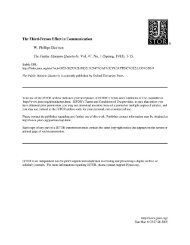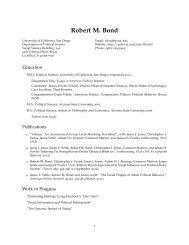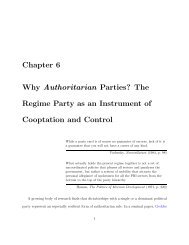Popkin-Reasoning Voter-Ch 3.pdf
Popkin-Reasoning Voter-Ch 3.pdf
Popkin-Reasoning Voter-Ch 3.pdf
You also want an ePaper? Increase the reach of your titles
YUMPU automatically turns print PDFs into web optimized ePapers that Google loves.
68 <strong>Ch</strong>aPter Three<br />
their primary campaigns will produce candidates better able to capture the<br />
presid.ency, and for ways to nullifii the Republicans'financial advantages.<br />
partisans of each party are arguing that defeat of their pet agendas or candidates<br />
is proof of the corruption and incapacity of the system. They are<br />
arguing that elections do not work. They are wrong.<br />
Gary Jacobson has refuted Republican arguments: incumbency is not responsible<br />
for Democratic advantages in congressional elections. In openseat<br />
elections since 1968,the GOP has made no gains in Congress.6s Democratic<br />
arguments are wrong as well. Democratic troubles begin with the<br />
changing nature of American society and the difficultproblems of reconciling<br />
interests within the Democratic coalition. As noted above, the fact that<br />
white-collar voters are more sensitive to inflation while blue-collar voters<br />
are more sensitive to unemployment gives the Democrats a more difficult<br />
balancing act to achieve on national economic policy.<br />
Ironically, while members of both political parties tend to explain divided<br />
govemment in candidate-centered tenns-congressional incumbency<br />
on one hand, and poor campaigners on the other-the root cause of<br />
divided govemment is divided views about the politicaffiie-s. neopte<br />
the two<br />
offices with diflerent problems and issues, and they rate the GOP higher on<br />
issues with which the president deals. Recall that Republicans are seen as<br />
better in dealing with foreign policy, national defense, and inflation, and<br />
Democrats are seen as better in dealing with Social Security, domestic programs,<br />
unemployment, minority rights, and the environment. Party<br />
images are an important source of information which voters use to assess<br />
the candidates for whom they vote. Republicans win the White House because<br />
inflation, foreign policy, and national defense are all more important<br />
to voters when they vote for president than when they vote for legislators.<br />
Democrats win Senate and House races because people care more about<br />
domestic issues, Social Security, and unemployment when they elect<br />
legislators.66<br />
Divided views of the party are based on voter reasoning about the differences<br />
between the job of the president and the job of the legislator, on<br />
one hand, and the images of the two parties, on the other. As John Petrocik<br />
notes, "Most voters recognize the policy strengths of the parties and respond<br />
to them."67<br />
The Growing Importance of Campaigns<br />
Divided govemment attests to both the limits and the impoftance of<br />
campaigns.<br />
. ..e .leri*;*.; , .<br />
Gotng without Data 69<br />
Divided government's roots in the different issue strengths of the two parlies<br />
attest to the limits of voter manipulation-the limited ability of candirlatcs<br />
in either party to use clever campaigns to obscure their historic perlirrmances<br />
with smoke and mirrors. Candidates' ability to stake out positklns<br />
at variance with past pafty performance on long-standing issues is<br />
llrnited.<br />
lnformation about past party performance is still important, however.<br />
'l'hc information shortcuts about party identification and party perforlllance<br />
on different issues serve as reality tests against which campaign<br />
drguments are tested. The relative weights of party and candidate will vary<br />
lxrth among issues and among offices. Candidates matter most where party<br />
nratters least; the less well image, the more sensitive<br />
to the candidate.6s<br />
Therootsof@ent,then,dependonreaSoningaboutpar-<br />
--?rllcs<br />
and candidates, which in tum depends on voters' use of information<br />
rtlrout party performance on issues and information about which issues are<br />
lllosl. relevant to diflerent elections. Such information use and reasoning<br />
drc connected to a campaign's ability to make connections between candirloles,<br />
offices, and issues.<br />
'l'he early voting studies suggest that modern mass-media campaigns<br />
rltrluld have larger efects than the campaigns of the l94Os. At that time, a<br />
vttlcr's strength of conviction was related to the political homogeneity of<br />
Itls tlr her associates. Most voters belonged to politically homogeneous sot'l,tl<br />
groups; the social gulf between the parties was so wide that a majority<br />
ol'voters had no close friends or associates voting differently from them.6e<br />
A rlccline in the political homogeneity of primary groups should lead to<br />
weaker conviction among voters and therefore allow more latitude for the<br />
Ittllucnce of the mass media. The political cleavages that exist today cut<br />
lll(lrc across social groups, which means that voters are typically in less honr()gcneous<br />
family, church, and work settings.To<br />
All voting studies have found that edueatiqn is one of the prime indica-<br />
lo!.s of voter ability to process information generated by campaigns and 1}1s<br />
lll.lss media. In the 1940s, fewer than one in eight voters had been to collcgfi6Eay<br />
nearly half of all voters have been to college. In the 1940s, over<br />
40 lrcrcent of the electorate had never reached high school; today this figttt'e<br />
ls l0 percent. This increase in educational level, then, gives greater<br />
polential import to political campaigns. The broadening of the electorate,<br />
rllrcussed in chapter 2, means that voters are following more national and<br />
Ittlernational issues. One striking example of this is the development of<br />
;rnrtf lmages based on the party's ability to deal with the problems of











